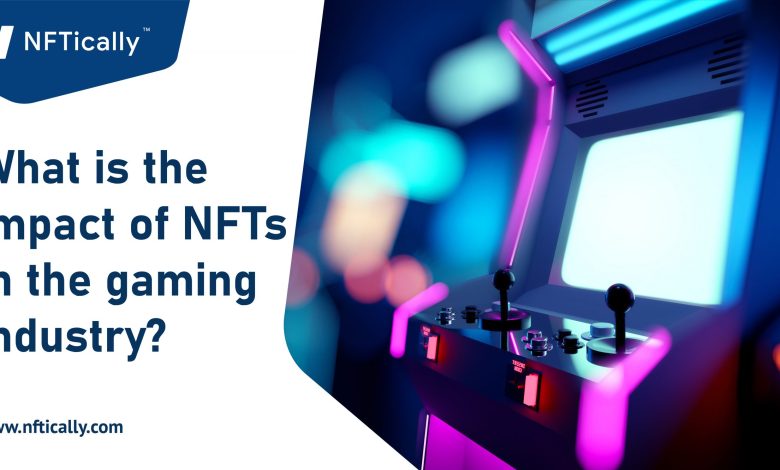The Role of NFTs in the Gaming Industry

- Understanding NFTs and their impact on the gaming industry
- Exploring the potential of NFTs to revolutionize in-game assets
- The rise of NFTs as a game-changer for gamers and developers alike
- How NFTs are reshaping the economics of virtual worlds
- Challenges and opportunities of integrating NFTs into gaming ecosystems
- The future of gaming: NFTs as a new frontier for innovation and creativity
Understanding NFTs and their impact on the gaming industry
NFTs, or non-fungible tokens, have been making waves in the gaming industry in recent years. These unique digital assets have the potential to revolutionize the way players interact with in-game items and assets. By leveraging blockchain technology, NFTs provide players with true ownership of their virtual goods, allowing them to buy, sell, and trade items with other players securely.
One of the key impacts of NFTs on the gaming industry is the concept of true ownership. Unlike traditional in-game items that are owned and controlled by game developers, NFTs give players the ability to truly own their digital assets. This opens up a whole new world of possibilities for players, allowing them to monetize their gaming experience in ways that were previously impossible.
Another significant impact of NFTs on the gaming industry is the potential for increased player engagement. By allowing players to buy, sell, and trade in-game items as NFTs, game developers can create a more dynamic and player-driven economy within their games. This can lead to increased player retention and a more vibrant gaming community.
Furthermore, NFTs have the potential to create new revenue streams for game developers. By minting and selling NFTs of in-game items, developers can tap into a new market of collectors and enthusiasts who are willing to pay a premium for rare and unique digital assets. This can help developers offset the rising costs of game development and create a more sustainable business model.
Overall, NFTs have the potential to revolutionize the gaming industry by giving players true ownership of their in-game assets, increasing player engagement, and creating new revenue streams for developers. As the technology continues to evolve, it will be exciting to see how NFTs shape the future of gaming.
Exploring the potential of NFTs to revolutionize in-game assets
The potential of Non-Fungible Tokens (NFTs) to transform in-game assets is a topic that has been gaining traction in the gaming industry. NFTs are unique digital tokens that represent ownership of a specific item or asset, and they are stored on a blockchain, making them secure and tamper-proof.
One of the key advantages of using NFTs for in-game assets is that they allow players to truly own the items they acquire in a game. Traditionally, in-game assets are owned by the game developer, and players have no control over them. With NFTs, players have full ownership of their assets, which means they can buy, sell, and trade them as they see fit.
Another benefit of NFTs in gaming is the potential for interoperability between different games. Because NFTs are stored on a blockchain, they can be easily transferred between games that support the same standard. This opens up a world of possibilities for players, who can use their assets across multiple games and platforms.
Furthermore, NFTs have the potential to revolutionize the way in-game economies work. By allowing players to truly own their assets, NFTs can create a more vibrant and dynamic economy within games. Players can earn real money by selling their assets to other players, which adds a new layer of depth to the gaming experience.
In conclusion, the potential of NFTs to revolutionize in-game assets is vast. From giving players true ownership of their assets to enabling interoperability between games, NFTs have the power to transform the gaming industry in exciting new ways. As developers and players alike continue to explore the possibilities of NFTs, we can expect to see even more innovation in the years to come.
The rise of NFTs as a game-changer for gamers and developers alike
NFTs have emerged as a revolutionary technology in the gaming industry, offering a new way for gamers and developers to interact with digital assets. These non-fungible tokens are unique digital assets that are stored on a blockchain, making them secure and immutable. The rise of NFTs has opened up a world of possibilities for gamers, allowing them to truly own their in-game items and characters.
For gamers, NFTs represent a game-changer as they provide a way to buy, sell, and trade in-game assets with real-world value. This means that players can now truly own their digital items, rather than just renting them from a game developer. NFTs also allow for interoperability between different games, meaning that players can use their assets across multiple platforms.
Developers are also benefiting from the rise of NFTs, as they provide a new revenue stream and a way to engage with their player base. By creating NFTs for in-game items, developers can generate additional income through sales and royalties. This incentivizes developers to create high-quality, unique content that players will want to invest in.
Overall, the rise of NFTs in the gaming industry is changing the way gamers and developers interact with digital assets. With the ability to truly own in-game items and the potential for new revenue streams, NFTs are reshaping the gaming landscape for the better.
How NFTs are reshaping the economics of virtual worlds
NFTs have been revolutionizing the economics of virtual worlds in the gaming industry. These unique digital assets are changing the way players interact with in-game items and virtual goods. By tokenizing game assets, developers can create scarcity and ownership, allowing players to truly own their digital belongings. This has opened up new opportunities for players to buy, sell, and trade virtual items in a secure and transparent manner.
One of the key benefits of NFTs in gaming is the ability to create verifiable scarcity. Unlike traditional in-game items that can be duplicated or replicated, NFTs are one-of-a-kind assets that are stored on the blockchain. This means that players can prove the authenticity and ownership of their virtual items, adding a new level of value and prestige to in-game assets.
Furthermore, NFTs are reshaping the way players engage with virtual economies. With the ability to buy, sell, and trade assets on decentralized marketplaces, players have more control over their gaming experience. This has led to the rise of player-driven economies, where the value of in-game items is determined by supply and demand, rather than by developers.
Challenges and opportunities of integrating NFTs into gaming ecosystems
Integrating NFTs into gaming ecosystems presents both challenges and opportunities for the industry. One of the main challenges is the potential for increased complexity in game development and maintenance. Developers will need to ensure that NFTs are seamlessly integrated into gameplay without disrupting the overall user experience. Additionally, there may be concerns about the environmental impact of NFTs due to their reliance on blockchain technology.
On the other hand, there are numerous opportunities for game developers to leverage NFTs to enhance player engagement and monetization. By creating unique and tradable in-game assets, developers can offer players a new level of ownership and customization. This can lead to increased player retention and a more vibrant in-game economy. Furthermore, NFTs can open up new revenue streams for developers through the sale of limited edition items or collectibles.
Overall, the integration of NFTs into gaming ecosystems has the potential to revolutionize the industry by providing players with new ways to interact with their favorite games. While there are challenges to overcome, the opportunities for innovation and growth are vast. As developers continue to explore the possibilities of NFTs in gaming, we can expect to see exciting new developments that push the boundaries of what is possible in the digital world.
The future of gaming: NFTs as a new frontier for innovation and creativity
NFTs are revolutionizing the gaming industry by offering a new frontier for innovation and creativity. These unique digital assets are changing the way gamers interact with in-game items, creating a more immersive and personalized gaming experience.
One of the key advantages of NFTs in gaming is the ability to truly own and trade digital assets. Unlike traditional in-game items that are owned by the game developers, NFTs give players full ownership of their virtual belongings. This opens up a whole new world of possibilities for gamers, allowing them to buy, sell, and trade items across different games and platforms.
Furthermore, NFTs enable developers to create truly unique and limited-edition items that can be collected and cherished by players. This not only adds value to the gaming experience but also provides a new revenue stream for game developers.
As the popularity of NFTs continues to grow, we can expect to see even more innovation in the gaming industry. From virtual real estate to in-game art, the possibilities are endless when it comes to integrating NFTs into games. This new frontier is sure to shape the future of gaming in ways we have yet to imagine.




